- CRAMP (CRAMPON, CRAMPOON or CRAMP-IRON)
- Heraldic terms used for bent pieces of metal employed in the strengthening of a building –
crampon, crampoon or cramp-iron (see also wolf-trap).

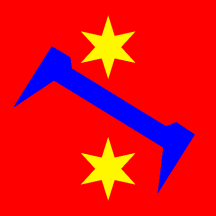
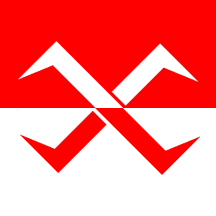
Flag of Welschenrohr-Gänsbrunnen;
Flag of Gerlafingen;
Flag of Biberist, Switzerland
- CRANCELIN
- The alternative heraldic term for a crown of rue – see crown of rue.
.gif)
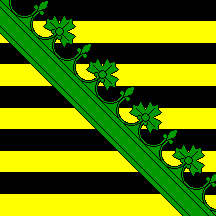
Arms of Saxony, Germany; Royal Standard of the
Kingdom of Saxony 1815–1918
- CRAVAT
- 1) A decorative scarf, usually in national or livery colours and often richly decorated,
generally tied with a bow to the staff below the finial, normally (but by no means exclusively)
used with military flags and sometimes displayed with a cockade (see also
cockade 1), cord(s) 1),
draping,
finial,
livery colours,
national colours 2) and
staff 2)).
- 2) Long black ribbons tied to the staff of a military colour below the finial
to signify mourning by the regiment or unit concerned for the loss of members
of that regiment, or when participating in a military or state funeral – but see
draping.
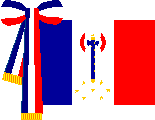
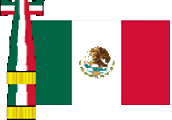
Presidential Standard, France 1940–1943 (fotw & CS);
National Flag of Mexico
Please note with regard to 1) that in French military usage, and possibly
in others, the cravat is employed (including use with car flags) to differentiate
between ranks and functions (see also fanion 3),
jack of honour, lanyard 1)
and lanyard pennant.
- CRENELLATED
- In vexillology, a term that is sometimes used to describe the battlements of a tower,
castle or wall in place of its heraldic equivalents – see
embattled.
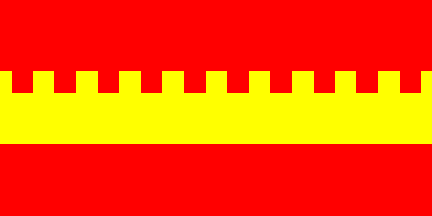
Flag of Judeţul Cahul 1998–2003, Moldova
- CRENELLED (or CRENELLÉ)
- Alternative heraldic terms to embattled – see embattled.
pc.gif)
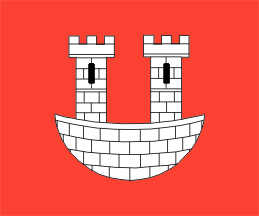
Arms and Flag of Pyskowice, Poland
- CRESCENT
- 1) In vexillology, a charge in the shape of a crescent moon formed by two interlinked
circles of varying size, generally (but not invariably) shown with the open horns towards
the fly – a quarter-moon (see also
disc and
waning or waxing moon).
- 2) In heraldry a charge in the form of a crescent moon whose horns unless otherwise
specified point upwards – but see moon 2) with following notes,
and the note b) below (also lunel).
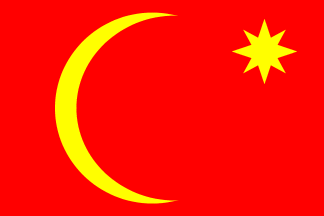
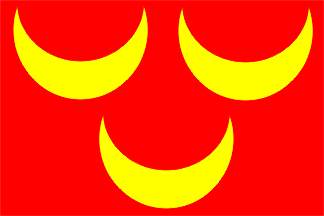
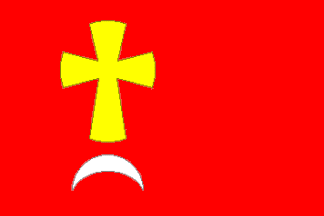
Flag of the Emirate of Ha'il 1835–1920;
Former Flag of Obdam, The Netherlands;
Flag of Odèn, Spain
Notes
a) With regard to 1) the crescent is often (but not invariably) considered to be symbolic of Islam.
b) Regarding 2) a crescent whose horns point downward (as illustrated
above) may be termed inverted or reversed – see ;reversed 2).
- CREST
- 1) The heraldic term for a symbol that is usually (but not invariably)
attached to the helm, is almost always set above a torse and generally
ensigned over the shield (see also Appendix IV,
armorial bearings,
coat of arms,
ensigned,
helm,
shield and
wreath 2)).
- 2) See "crested" (below)
- 3) See ship’s crest.
- 4) See military crest.
- 5) The term is sometimes used to describe a shield or set of armorial bearing – but see note
below.
![[crest]](../images/v/vx-hr)ka-jo.gif)
![[crest]](../images/v/vx-hmssovereign).jpg)
![[crest]](../images/v/vx-us)nmmil.gif)
Arms of Josipdol, Croatia;
Ship's crest of HMS Sovereign (Wikipedia);
State Military Crest of New Mexico, US
Please note that the term "crest" should only be used as specifically defined in 1), 2), 3)
and 4) above, and should not be considered as a synonym for a coat of arms or set of armorial bearings
(see also
armorial bearings and
coat of arms).
- CRESTED (or CREST)
- A heraldic term that is applicable to all birds with some sort of head decoration, it is, however,
mainly applied to roosters – but see comb(ed) (also
crest 1) above).
![[crested]](../images/v/vx-ch-fr282.gif)
Flag of Cutterwil, Switzerland
- CREW’S MEAL PENNANT
- See meal pennant.
![[crew's meal pennant]](../images/v/vx-sig~chow.gif)
Crew’s Meal Pennant, US
- CRINED
- In heraldry the term used when referring to the hair on a person's head, or to the mane of a horse
when of another tincture (see also heraldry and
tinctures).
.gif)
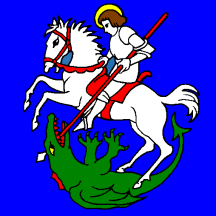
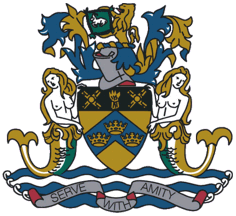
Arms of Portsmouth, England;
Flag of Chermignon, Switzerland;
Arms of Boston Borough Council, England
- CROATIAN WATTLE
- See wattle(d) 1)
![[Croatian wattle]](../images/v/vx-hr-ndhum.gif)
Flag of Ustasha Youth 1941–1945, Croatia
- CROWN
- 1) A ceremonial headpiece consisting of a circlet (almost invariably) made of precious metal and
adorned with pearls/gemstones – see note a) below (also coronet 1),
coronet 2), orb and
sceptre).
2) A variously detailed charge symbolizing the status or identity of a particular institution or
organization (see also astral crown,
crown of arms, civic crown 2),
mural crown 1), provincial crown
and naval crown.
3) In heraldry see antique crown 2),
civic crown 1),
crown triumphal, ensigned,
mural crown 2) and note b) below.
![[crown]](../images/v/vx-dk-krone.gif)
![[crown]](../images/v/vx-gb_tudor.gif)
![[crown]](../images/v/vx-crownspain.gif)
Royal Crowns, Denmark,
England and
Spain (Wikimedia)
Notes
a) With regard to 1), a crown with a curved
bar or bars across the top and a cap within generally (but not invariably) signifies
a reigning monarch, however, the actual design will usually be specific
to a given country and considerable variations exist.
b)
Regarding 3), in
heraldry the term "crown" has a wider use than those referenced above, and it
is suggested that a
specialist glossary or dictionary of heraldry be consulted for full details.
- CROWN COLOURS (or COLORS)
- A translation of the Spanish term Banderas Coronelas and referring to a Queen’s,
King’s or Imperial Colour – see
colour 2) and colours 2).
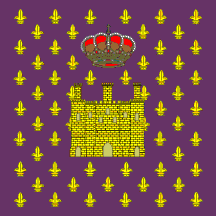
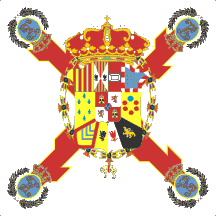
Crown/King’s Colour of the Royal Infantry Guard 1794, Spain;
Crown/Queen’s Colour of the Regiment of Chasseurs Isabel II
1841–1844, Spain
- CROWNED
- In heraldry see ensigned
(also crown).
l.gif)
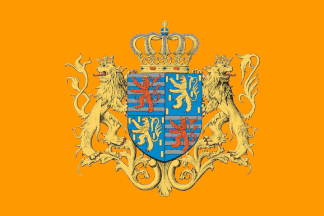
Lesser Arms and Grand-Ducal Standard
of Luxembourg
- CROWN OF ARMS
- A newly introduced term – and a translation of the German Wappenkrone – that may be used
to describe the type of crown which is created from a series related arms, and possibly inspired by the
pavisade – see pavisade (also
coat of arms 2),
hamburgian coronet,
leafy crown,
mural crown 1) and
provincial crown 2).
m.gif)
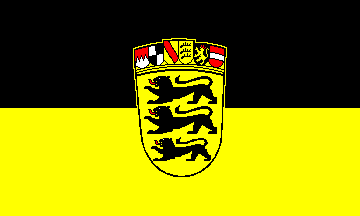
Middle Arms and State Flag of
Baden-Württemberg, Germany
- CROWN OF RUE
- The heraldic term for a coronet placed in bend – or diagonally – across rather
than above a shield or quarter – a crancelin (see also ‘bend’,
coronet,
in bend,
quarter and
shield 1))
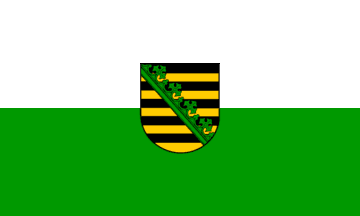

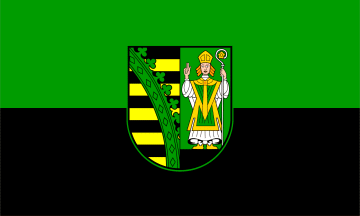
Flag of Saxony, Germany;
Royal Standard of the Kingdom of Saxony 1815–1918;
Flag of Land Hadeln, Germany
- CROWN OF THE HOLY SPIRIT
- In Christian, particularly Iberian tradition, the term for a crown bearing a dove set on its central
point (see also marian crown and its following note).
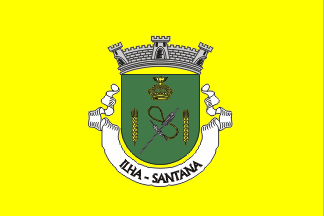
.gif)
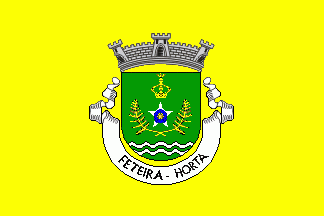
Flag of Ilha, Portugal;
Arms of Santo Espírito, Portugal;
Flag of Feteira, Portugal
- CROWN TRIUMPHAL
- The heraldic term for a closed garland or chaplet, usually composed of laurel
leaves, and based on the ancient Roman triumphal ornament (see also
civic crown 2),
decking,
garland and
wreath of immortelles).
![[collar]](../images/v/vx-civiccrown.gif)
(Parker)
- CROZIER
- In some Christian usages the ceremonial staff of a prelate – a bishop or
archbishop’s crook or pastoral staff (see also mitre,
pilgrim's staff and
stringed).
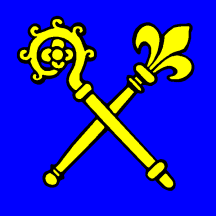
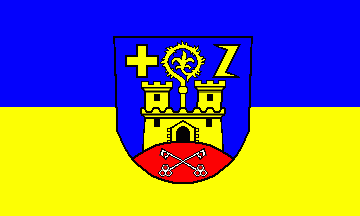
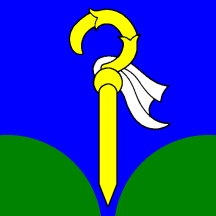
Flag of Schmitten, Switzerland;
Flag of Tholey, Germany;
Flag of Wangen, Switzerland
- CRUCIFEROUS
- The term, and a translation from the Portuguese, that is used in largely South European heraldry when
a charge (such as an orb or crown) is ensigned with a cross – see
ensigned.
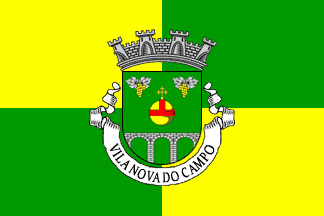
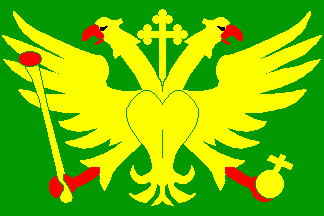
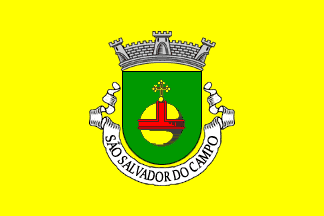
Flag of Vila Nova do Campo, Portugal;
Historical flag of Szamosújvár, Kingdom of Hungary;
Flag of São Salvador do Campo, Portugal
- CRUTCH
- A term for the central point at which the two triangles formed by a swallow-tailed
cut in the fly meet (see also orthogonal,
palm and
swallow-tail(ed)).
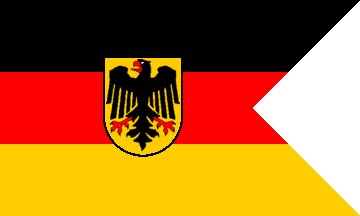
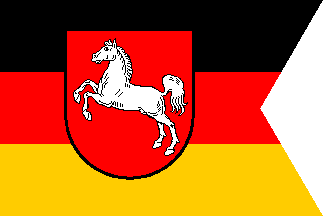
Naval Ensign of Germany;
State Ensign of Lower Saxony, Germany
- CRUTCH CROSS
- A translation of the German term Kruckenkreuz/Krückenkreuz – in heraldry see
cross potent).
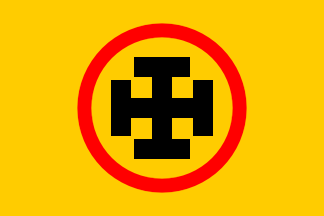
A flag of the Christian Falangist Party, Germany
- CUSTOMS FLAG (ENSIGN, JACK or PENNANT)
- A flag or ensign, different from the national/state flag or government ensign or a pennant, which
specifically identifies the installations or vessels
of a country’s customs service (see also national flag,
‘government ensign’ and ‘service ensign’ under ensign,
and state flag).
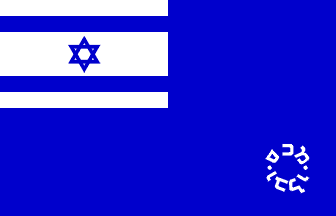
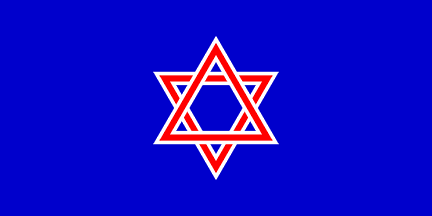
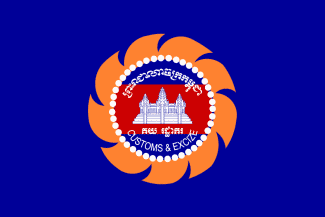
Customs Flag/Jack,
Israel; Customs Flag, Sudan;
Customs Flag, Cambodia
- CYBERVEXILLOLOGY (or CYBERVEX)
- Vexillological research and/or the publication of vexillological information
using electronic means, particularly the Internet or other electronic delivery
systems.
- CYPHER
- See royal cypher 1) and
monogram.

Cypher of the French Republic (CS)



.gif)




pc.gif)




![[crest]](../images/v/vx-hr)ka-jo.gif)
![[crest]](../images/v/vx-hmssovereign).jpg)
![[crest]](../images/v/vx-us)nmmil.gif)
![[crested]](../images/v/vx-ch-fr282.gif)
.gif)


![[Croatian wattle]](../images/v/vx-hr-ndhum.gif)
![[crown]](../images/v/vx-dk-krone.gif)
![[crown]](../images/v/vx-gb_tudor.gif)
![[crown]](../images/v/vx-crownspain.gif)


l.gif)

m.gif)





.gif)














![[crew's meal pennant]](../images/v/vx-sig~chow.gif)
![[collar]](../images/v/vx-civiccrown.gif)
